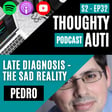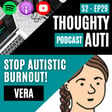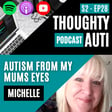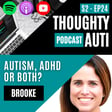
What is SPD? - Living With Sensory Processing Disorder & Autism w/21AndSensory
What is Sensory Processing Disorder? How do deal with sensory difficulties in your day-to-day? What challenges faces someone with SPD? Are you meeting your own sensory needs?
In this episode of the Thoughty Auti Podcast, Thomas talks to Emily (@21andsensory) about sensory needs/difficulties and the many reasons why having Sensory Processing Disorder (SPD) can make life a little more difficult to navigate.
We talk about the recent development of the Sunflower Lanyard Scheme, what individuals can do to cope with daily life and the ways other people can make being sensory... just a little bit more comfortable.
Emily received a diagnosis of ASD in late last year and lives with both anxiety and SPD.
Whether its sunglasses, noise-canceling headphones, fidget toys, sensory rooms or sleep aids... her blog, Instagram page, and podcast offer new insights into the sensory world of autism!
If you have an exciting or interesting story and want to appear on the next podcast, please contact me at: aspergersgrowth@gmail.com
Emily’s Links:-
►Instagram - https://www.instagram.com/21andsensory/
►Blog - https://21andsensory.wordpress.com/
►Podcast - https://21andsensory.wordpress.com/21andsensory-podcasts/
►Twitter -https://twitter.com/21andsensory
▬▬▬▬▬▬▬▬▬▬▬▬▬▬▬▬▬▬▬▬▬▬▬▬▬▬▬▬▬▬▬
Channel Merchandise - https://teespring.com/stores/aspergers-growth
Support via Patreon! - https://www.patreon.com/aspergersgrowth
Social Media ♥ -
☼ Facebook - Aspergers Growth
☼ Twitter/Instagram - @aspergersgrowth
♫ Listen On -
Spotify - https://open.spotify.com/show/6vjXgCB7Q3FwtQ2YqPjnEV
Apple Podcasts - https://podcasts.apple.com/gb/podcast/thoughty-auti-the-autism-mental-health-podcast/id1470689079
Music -
♫ Track: [Chill Music] Ikson - Reverie [No Copyright Music]
Advert Track: Empty Parking Lot - Colours Of Illusion [Epidemic Sound]



















